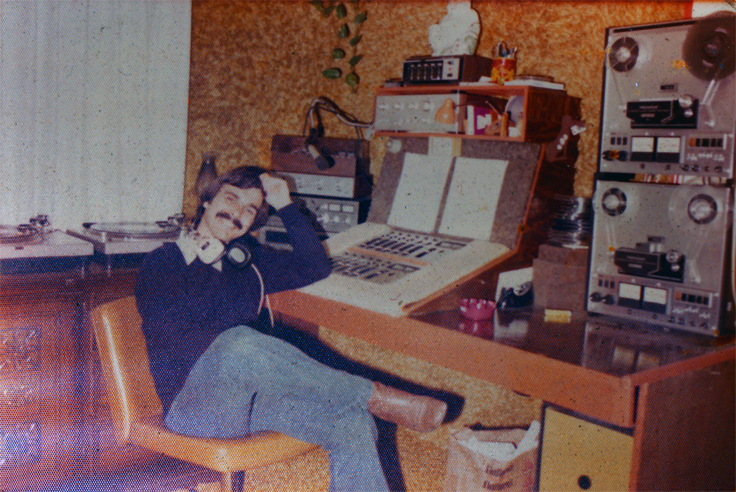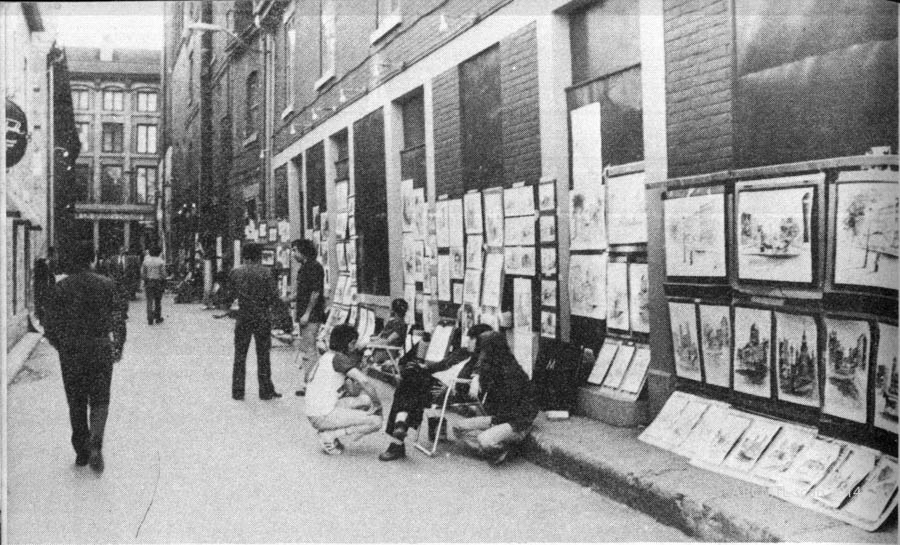I’d like to tell you the interesting story of Martin Bouchard.
Unfortunately, I don’t know much about him. As a musician, he has no web presence beyond his Bandcamp page. No Soundcloud. No Twitter. No Tumblr. His Bandcamp links to a Facebook page that looks like it has nothing to do with his music. It’s mostly photos he takes at art galleries. It’s enigmatic. I could try to get in touch and find out his backstory, but I’m worried it wouldn’t live up to the intrigue. And besides, research is hard. So I’ve invented a backstory for him.
And now, here’s the interesting (and entirely fictional) story of Martin Bouchard.
Martin Bouchard was born in Brazil under the name Marcelo Balau in 1970. His father, Henrique, was a sound engineer at the height of the Bossa Nova craze, and worked in-studio with some of the biggest names in Jazz. Henrique met singer Astrud Gilberto in 1968, and they were immediately and desperately in love. She soon was pregnant.
However, Astrud was married to Stan Getz at the time, and having already been divorced once before, she couldn’t risk another marital collapse. So she told Getz she needed some time to tend to a sick aunt, disappeared from the scene for a while to give birth to little Marcelo, and told a heartbroken Henrique that she couldn’t be with him to watch their son grow up.

Marcelo never knew his mother, but her voice echoed through the house through his childhood via the record player. Marcelo’s father played her records on repeat as he mourned their brief but loving relationship. Her voice lulled little Marcelo to sleep every night during infancy. To his father’s surprise, Marcelo sang before he could talk. Perhaps it was the influence of his absent-yet-always-present mother’s voice…but Marcelo’s voice sounded eerily similar to his mother’s soft tones.

As a child, Marcelo’s interest in music became all-consuming. With no help raising his son, Henrique was forced to bring Marcelo into the studio with him, so he was raised by a village of musicians, each one imparting their own wisdom to Marcelo in impromptu lessons. Guitar. Percussion. Piano. He learned them all, from the best in the business.

But singing remained his love. As much as he loved playing an instrument, singing was so ingrained into his subconscious that he couldn’t help himself. One day as Marcelo sat in his father’s studio, he started singing along to a tune he recognized, as one of the recording artists practiced for the day’s session. The song was “The Girl from Ipanema,” and the man playing was…Stan Getz. Marcelo’s voice was the audio double of his mother’s, to the point that a startled Getz stopped playing and turned to ask why Astrud had dropped by the studio. What he saw instead was Marcelo. If the voice wasn’t enough to make Getz suspicious, the eyes clinched it.
Flying into a rage, Getz demanded that Henrique explain himself. Lying would have been fruitless. Tears streaming down his face, he admitted to the affair, admitted to the secret child. Getz told Henrique he would never work with him again, and that he’d see to it nobody else in the industry would either.
Henrique and Marcelo had no choice but to leave Brazil. They settled in Montreal, where Henrique tried to find work in one of that city’s many jazz clubs. But jazz is a close community, and nobody would give Henrique any work, knowing that Stan Getz had blacklisted him. Instead, he was relegated to living off tips, clearing tables in seedy after-hours clubs.
Having nurtured Marcelo’s talent, Henrique now discouraged him from pursuing music. Who could blame him? It was an industry that had given him everything, only to take it away so cruelly. He wanted his son to have a fresh start. They went to the local courthouse together to legally change their names. Marcelo Balau became Martin Bouchard, and his father became Henri, in an attempt to disappear into French-Canadian culture.

He studied art in high school, and became a competent painter. Still, his heart cried out for music. It pained him to stay away from music, but painting allowed for some artistic outlet. In 2012, when his father died from heart failure, Martin decided to release an album dedicated to his memory. It would be the only album he would ever release, and he wouldn’t sing; it would be an album of instrumental serenades, played on the guitar with just a hint of Bossa Nova. The album cover featured one of his own paintings.
But even though the album was instrumental, Martin could hear, as he played, the voice of his dear estranged mother Astrud, humming along in a beautiful requiem for Henrique. For all three of them; a beautiful musical trio who never got to be together.
What makes this a beautiful song:
1. It doesn’t keep a consistent tempo, just strolls along at its own pace.
2. The sound is just a bit muffled, as if either the guitar or the microphone isn’t of the best quality. Or as if he’s playing just for himself, not worried about who the audience is or what they think.
3. The style isn’t really folk or bossa or classical, but little bits of each. But if I can forgive anyone for having a mixed musical identity, it’s Martin Bouchard.
Recommended listening activity:
Watching people on the bus and inventing life stories for them in your head.
